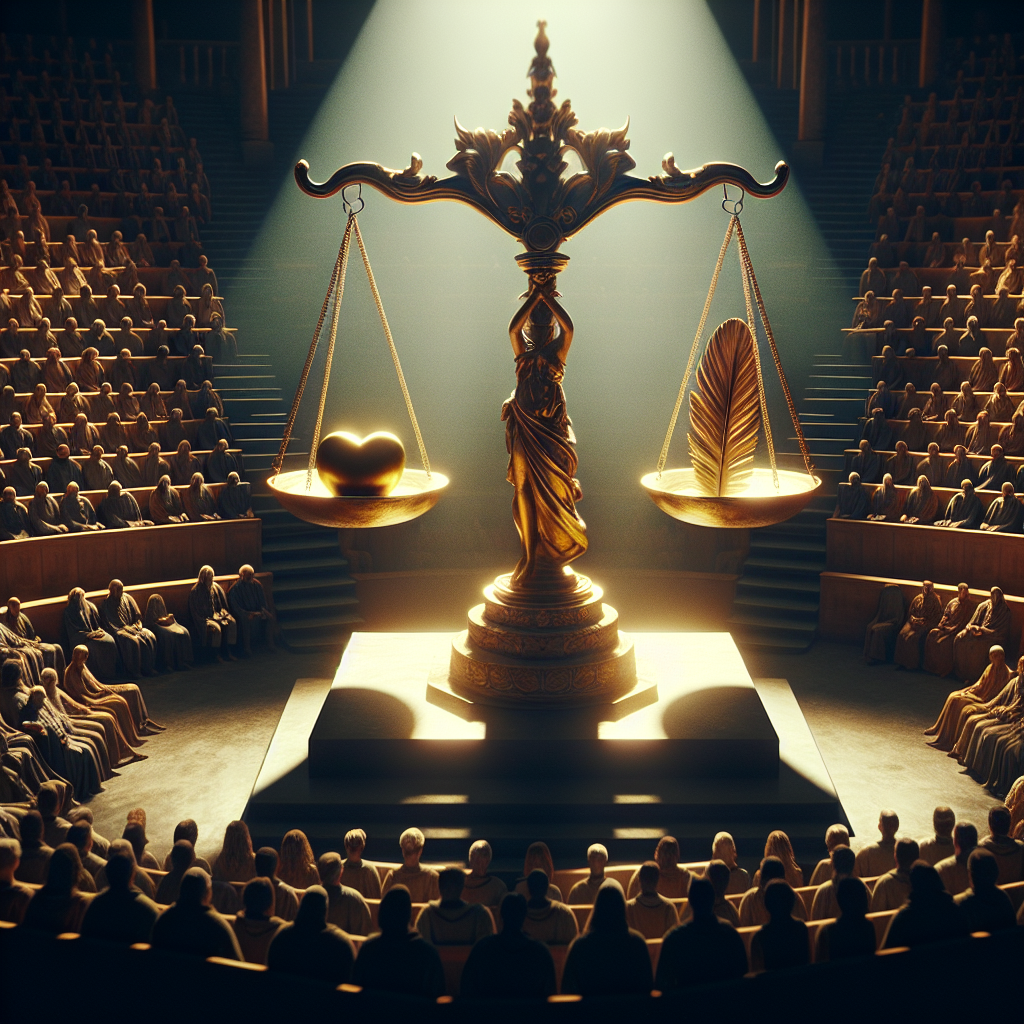Spiritual Devotional about Ethical and Moral Principles
Title: Living in Harmony: Embracing Ethical and Moral Principles
—
Hello beautiful souls! 🌟 Today, let’s embark on a spiritual journey exploring the divine dance of ethical and moral principles that guide our lives. In a world bustling with voices and choices, standing firm in our values is both a beacon of peace and a source of strength.
### The Heartbeat of Ethics
At the heart of our spiritual walk lies a commitment to live ethically—to choose what is good, right, and just in the sight of the Creator and our fellow humans. But how do we discern what is ethical? We turn to the Bible, which provides timeless wisdom.
Proverbs 3:5-6 reminds us: “Trust in the Lord with all your heart and lean not on your own understanding; in all your ways acknowledge Him, and He shall direct your paths.” When we anchor our actions in trust and acknowledge divine guidance, our ethical compass remains true.
Living ethically isn’t just about doing no harm; it’s about actively spreading goodness, kindness, and truth in all our interactions. Remember the Golden Rule in Matthew 7:12: “So in everything, do to others what you would have them do to you.” What a joyful call to live each day embedded in love and mutual respect!
### The Moral Mosaic
Morality can be seen as the colorful threads interwoven through our ethical canvas. It’s about embracing virtues like honesty, courage, compassion, and faithfulness. Inspired by Galatians 5:22-23, where the fruit of the Spirit—love, joy, peace, patience, kindness, goodness, faithfulness, gentleness, and self-control—guide us, we are encouraged to weave these qualities into the fabric of our lives.
Picture each moral choice as a brushstroke on the masterpiece of your life, each deliberate act painting a scene rich with integrity and grace. Such acts are more than individual successes; they form a testament to what it means to live a life that echoes divine love.
### Shining as Light
As we grow in understanding and implement these principles, let us become beacons of hope and inspiration. Jesus calls us to be the “light of the world” (Matthew 5:14). Just as a lighthouse guides ships to safety, your life—lived with faith-driven principles—has the power to guide others toward their own realization of a just and loving path.
### Conclusion: Let’s Radiate Love and Hope
Incorporating ethical and moral principles into our daily walk doesn’t make life restrictive; it makes life abundant. As we align with God’s heart, we become partakers in His grand vision of a world filled with love, justice, and joy.
Embrace this journey with enthusiasm. Celebrate every moment of kindness, every choice for justice, and every step toward peace. Let’s inspire one another, lifting spirits and hearts, as we forge a path of integrity and divine love. 🌈
Together, let’s write a story of unwavering commitment to God’s truths, one filled with light, hope, and boundless love. Keep shining, beloved friends, for the world needs your beautiful light! 💖
—
May your day sparkle with blessings, kindness, and divine encounters. Let’s walk this path together, ever inspired by God’s love and wisdom!
Explore and dig up answers yourself with our BGodInspired Bible Tools! Be careful – each interaction is like a new treasure hunt… you can get lost for hours 🙂
Q&A about Ethical and Moral Principles
Certainly! Here’s a Q&A that explores various aspects of ethical and moral principles:
Q1: What are ethical and moral principles?
A1: Ethical and moral principles are guidelines that help individuals determine the rightness or wrongness of actions. Ethics generally refers to rules provided by an external source, such as a code of conduct in workplaces or principles in professions. Morals, on the other hand, refer to an individual’s own principles regarding right and wrong and are often shaped by cultural, religious, or personal beliefs.
Q2: How do ethical principles differ from legal rules?
A2: Ethical principles are concerned with what is good for individuals and society, encompassing values such as fairness, justice, and respect for others. They might not always align with legal rules, which are the laws enacted by governmental bodies and are enforceable by legal institutions. An action might be legal but unethical, or illegal but deemed ethical under certain circumstances.
Q3: Can you give an example of a common ethical dilemma?
A3: A common ethical dilemma is the trolley problem, where a person must decide whether to pull a lever to redirect a runaway trolley onto a track where it will kill one person instead of five. This dilemma raises questions about utilitarianism (maximizing overall happiness) versus deontological ethics (following rules or duties).
Q4: What role do cultural perspectives play in shaping ethical and moral principles?
A4: Cultural perspectives have a profound impact on ethical and moral principles. Different cultures prioritize different values, which can lead to variations in what is considered ethical or moral. For instance, collectivist cultures might emphasize community well-being over individual rights, while individualistic cultures might do the opposite.
Q5: How can conflicts between personal morals and professional ethics be resolved?
A5: Conflicts between personal morals and professional ethics can be challenging. Resolution often involves identifying the core principles at stake, seeking guidance from a mentor or advisor, and considering the consequences of different actions. Open dialogue and finding a compromise that aligns closely with both personal and professional standards are also key strategies.
Q6: Why is it important for organizations to have a code of ethics?
A6: A code of ethics is essential for organizations as it establishes a clear framework for ethical decision-making and behavior. It helps in maintaining a consistent standard across the organization, builds trust with stakeholders, and can prevent unethical conduct by providing employees with clear guidelines on handling various situations.
Q7: How do ethical theories like utilitarianism and deontology guide moral decision-making?
A7: Ethical theories offer different frameworks for evaluating moral decisions. Utilitarianism, for example, suggests that the best action is one that maximizes overall happiness or utility. Deontology, on the other hand, is concerned with the inherent morality of actions themselves, suggesting that some actions are morally required or forbidden regardless of their outcomes. These theories can provide structured approaches to ethical reasoning.
Feel free to ask more questions or request further elaboration on any specific topic!


